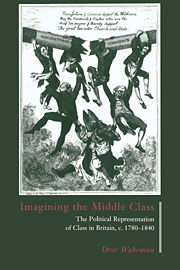Book contents
- Frontmatter
- Contents
- List of figures
- Acknowledgments
- 1 Imagining the ‘middle class’: an introduction
- PART I AGAINST THE TIDE
- PART II THE TUG OF WAR
- PART III WITH THE TIDE
- 7 The social construction of the ‘middle class’
- 8 The parallels across the Channel: a French aside
- 9 The debates on the Reform Bill: bowing to a new representation of the ‘middle class’
- 10 Inventing the ever-rising ‘middle class’: the aftermath of 1832
- 11 1832 and the ‘middle-class’ conquest of the ‘private sphere’
- Epilogue
- Index
8 - The parallels across the Channel: a French aside
Published online by Cambridge University Press: 08 January 2010
- Frontmatter
- Contents
- List of figures
- Acknowledgments
- 1 Imagining the ‘middle class’: an introduction
- PART I AGAINST THE TIDE
- PART II THE TUG OF WAR
- PART III WITH THE TIDE
- 7 The social construction of the ‘middle class’
- 8 The parallels across the Channel: a French aside
- 9 The debates on the Reform Bill: bowing to a new representation of the ‘middle class’
- 10 Inventing the ever-rising ‘middle class’: the aftermath of 1832
- 11 1832 and the ‘middle-class’ conquest of the ‘private sphere’
- Epilogue
- Index
Summary
All the higher ranks [superiorites], whatever their age and their nature, must, I repeat, accept this fact, the definitive fact of our era, namely the triumph of the middle classes.
(Francois Guizot, 1837)The word middle classes, I repeat, is a lie. There are no middle classes.
(Henri Fonfrede, 1839)By now the reader might have been struck by one peculiar consequence of the present argument. The rise of the ‘middle class’, familiar ad nauseam as one of the most universal characterizations of modern society, here turns out to be a notion that emerged from very particular circumstances, circumstances that prevailed in a specific society at a specific historical moment. As we shall see further, the leap to a universalized understanding of the ‘middle class’ had in itself specific historical origins and logic. But even without universalizing presuppositions, we may still want to raise our heads above British waters and ask similar questions of other comparable societies, in their own no less distinct and historically specific conditions. When and how did people elsewhere come to believe that they too lived in societies structured around a ‘middle class’, and what further light can such comparisons shed on the uses of this particular conceptualization of society?
The case of America, an interesting contrast with that of Britain, is considered later. The present chapter examines, however briefly, the developments in France following the Bourbon Restoration in 1815. Its goal is not to provide an analogous study of the uses of ‘middle-class’ language in post-Napoleonic France, nor merely to establish ideational pipe-lines, as it were, through which a genealogy of concepts can be traced from London to Paris and back.
- Type
- Chapter
- Information
- Imagining the Middle ClassThe Political Representation of Class in Britain, c.1780–1840, pp. 273 - 297Publisher: Cambridge University PressPrint publication year: 1995



